A Comprehensive Report on Learning and Development in Organisations
VerifiedAdded on 2023/06/12
|10
|3275
|114
Report
AI Summary
This report provides a detailed overview of learning and development within organizations, focusing on the concepts of organizational learning and learning organizations. It explores the key elements of organizational learning, including knowledge creation, retention, and transfer, and emphasizes the importance of fostering a learning culture to enhance employee satisfaction, productivity, and adaptability. The report also examines relevant theories and models of organizational learning, such as experiential learning theory and adaptive and generative learning theory, highlighting their impact on organizational development and performance. Furthermore, it differentiates between organizational learning and learning organizations, discussing the attributes and elements of a learning organization, such as collaborative learning, lifelong learning, and knowledge sharing. The report concludes by underscoring the significance of continuous learning and adaptation for organizations to thrive in competitive environments.
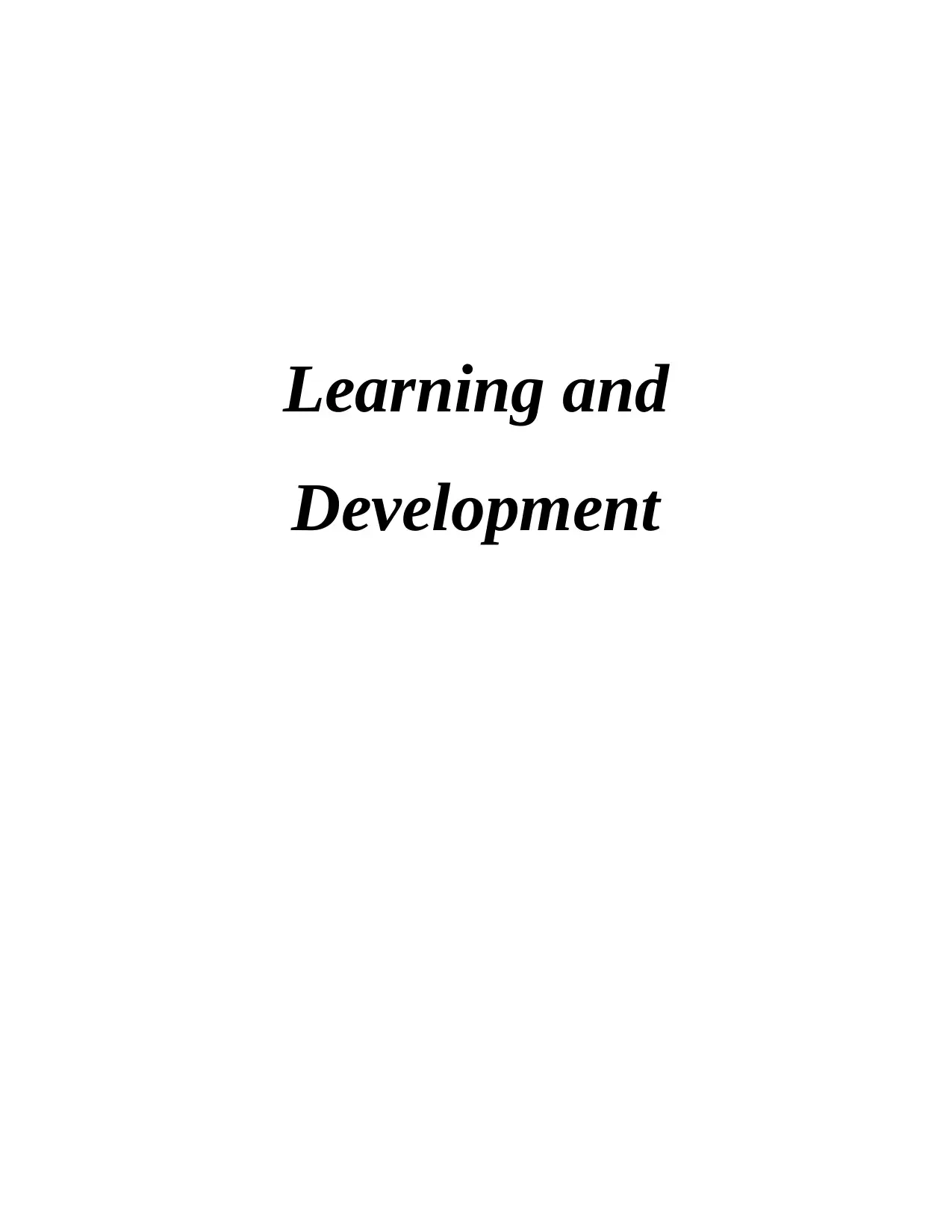
Learning and
Development
Development
Paraphrase This Document
Need a fresh take? Get an instant paraphrase of this document with our AI Paraphraser
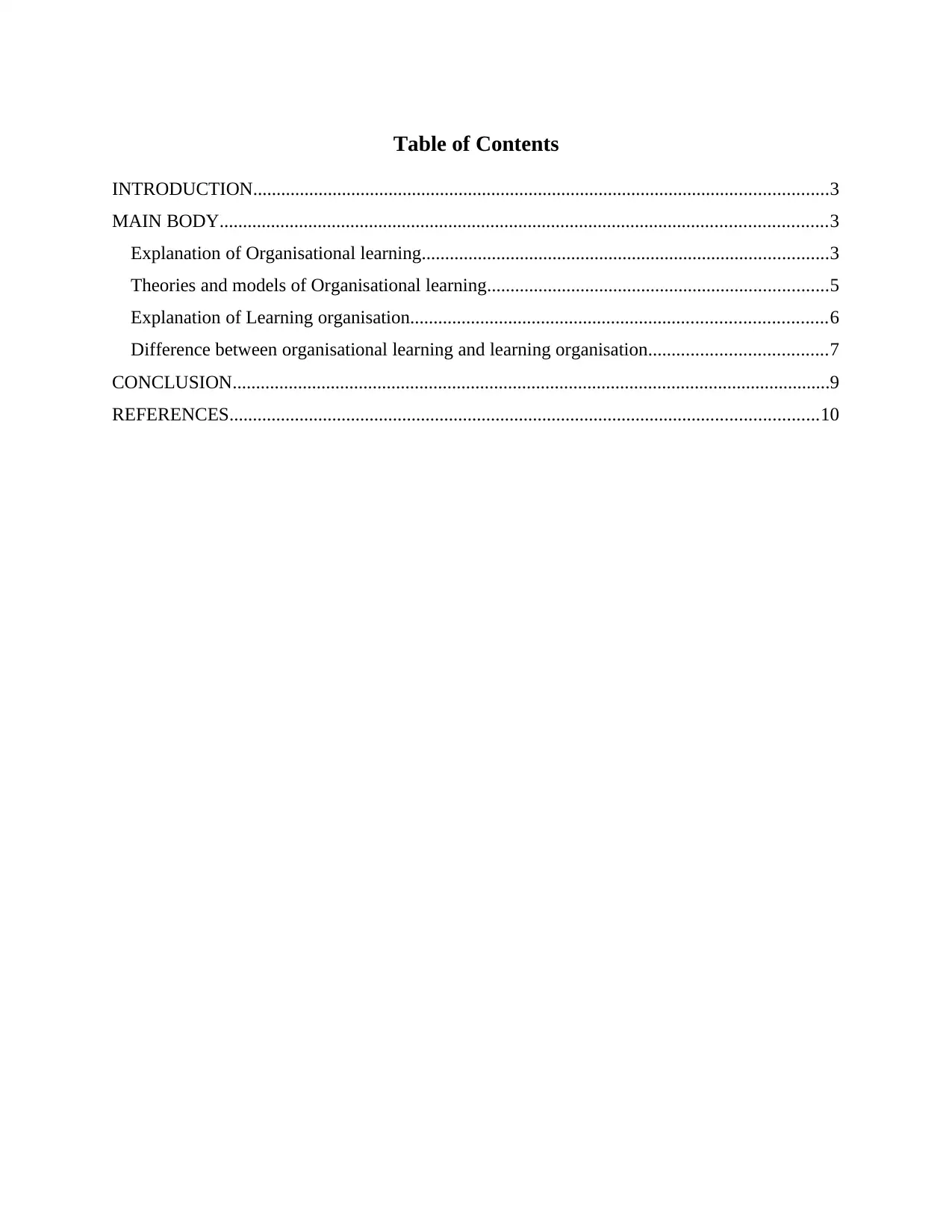
Table of Contents
INTRODUCTION...........................................................................................................................3
MAIN BODY..................................................................................................................................3
Explanation of Organisational learning.......................................................................................3
Theories and models of Organisational learning.........................................................................5
Explanation of Learning organisation.........................................................................................6
Difference between organisational learning and learning organisation......................................7
CONCLUSION................................................................................................................................9
REFERENCES..............................................................................................................................10
INTRODUCTION...........................................................................................................................3
MAIN BODY..................................................................................................................................3
Explanation of Organisational learning.......................................................................................3
Theories and models of Organisational learning.........................................................................5
Explanation of Learning organisation.........................................................................................6
Difference between organisational learning and learning organisation......................................7
CONCLUSION................................................................................................................................9
REFERENCES..............................................................................................................................10
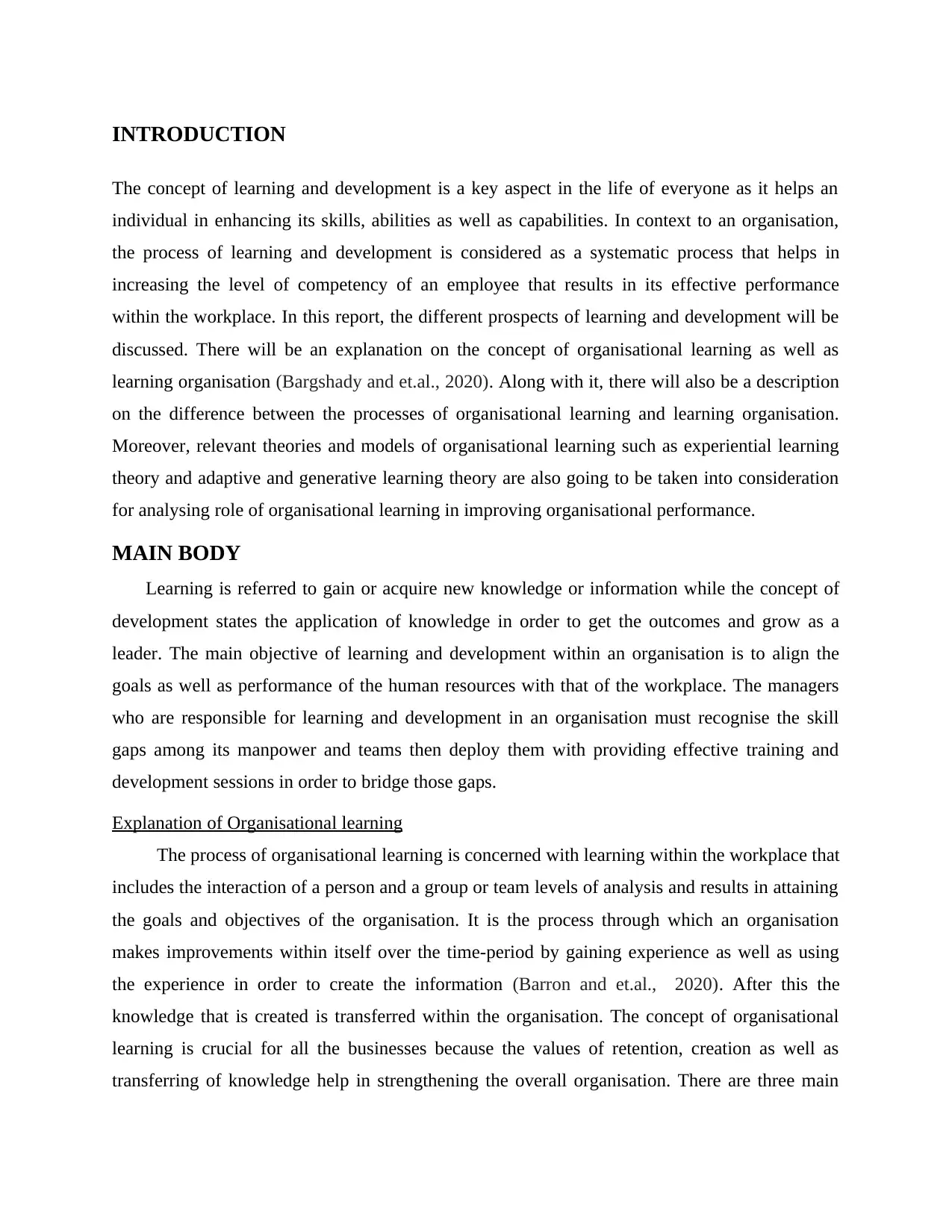
INTRODUCTION
The concept of learning and development is a key aspect in the life of everyone as it helps an
individual in enhancing its skills, abilities as well as capabilities. In context to an organisation,
the process of learning and development is considered as a systematic process that helps in
increasing the level of competency of an employee that results in its effective performance
within the workplace. In this report, the different prospects of learning and development will be
discussed. There will be an explanation on the concept of organisational learning as well as
learning organisation (Bargshady and et.al., 2020). Along with it, there will also be a description
on the difference between the processes of organisational learning and learning organisation.
Moreover, relevant theories and models of organisational learning such as experiential learning
theory and adaptive and generative learning theory are also going to be taken into consideration
for analysing role of organisational learning in improving organisational performance.
MAIN BODY
Learning is referred to gain or acquire new knowledge or information while the concept of
development states the application of knowledge in order to get the outcomes and grow as a
leader. The main objective of learning and development within an organisation is to align the
goals as well as performance of the human resources with that of the workplace. The managers
who are responsible for learning and development in an organisation must recognise the skill
gaps among its manpower and teams then deploy them with providing effective training and
development sessions in order to bridge those gaps.
Explanation of Organisational learning
The process of organisational learning is concerned with learning within the workplace that
includes the interaction of a person and a group or team levels of analysis and results in attaining
the goals and objectives of the organisation. It is the process through which an organisation
makes improvements within itself over the time-period by gaining experience as well as using
the experience in order to create the information (Barron and et.al., 2020). After this the
knowledge that is created is transferred within the organisation. The concept of organisational
learning is crucial for all the businesses because the values of retention, creation as well as
transferring of knowledge help in strengthening the overall organisation. There are three main
The concept of learning and development is a key aspect in the life of everyone as it helps an
individual in enhancing its skills, abilities as well as capabilities. In context to an organisation,
the process of learning and development is considered as a systematic process that helps in
increasing the level of competency of an employee that results in its effective performance
within the workplace. In this report, the different prospects of learning and development will be
discussed. There will be an explanation on the concept of organisational learning as well as
learning organisation (Bargshady and et.al., 2020). Along with it, there will also be a description
on the difference between the processes of organisational learning and learning organisation.
Moreover, relevant theories and models of organisational learning such as experiential learning
theory and adaptive and generative learning theory are also going to be taken into consideration
for analysing role of organisational learning in improving organisational performance.
MAIN BODY
Learning is referred to gain or acquire new knowledge or information while the concept of
development states the application of knowledge in order to get the outcomes and grow as a
leader. The main objective of learning and development within an organisation is to align the
goals as well as performance of the human resources with that of the workplace. The managers
who are responsible for learning and development in an organisation must recognise the skill
gaps among its manpower and teams then deploy them with providing effective training and
development sessions in order to bridge those gaps.
Explanation of Organisational learning
The process of organisational learning is concerned with learning within the workplace that
includes the interaction of a person and a group or team levels of analysis and results in attaining
the goals and objectives of the organisation. It is the process through which an organisation
makes improvements within itself over the time-period by gaining experience as well as using
the experience in order to create the information (Barron and et.al., 2020). After this the
knowledge that is created is transferred within the organisation. The concept of organisational
learning is crucial for all the businesses because the values of retention, creation as well as
transferring of knowledge help in strengthening the overall organisation. There are three main
⊘ This is a preview!⊘
Do you want full access?
Subscribe today to unlock all pages.

Trusted by 1+ million students worldwide
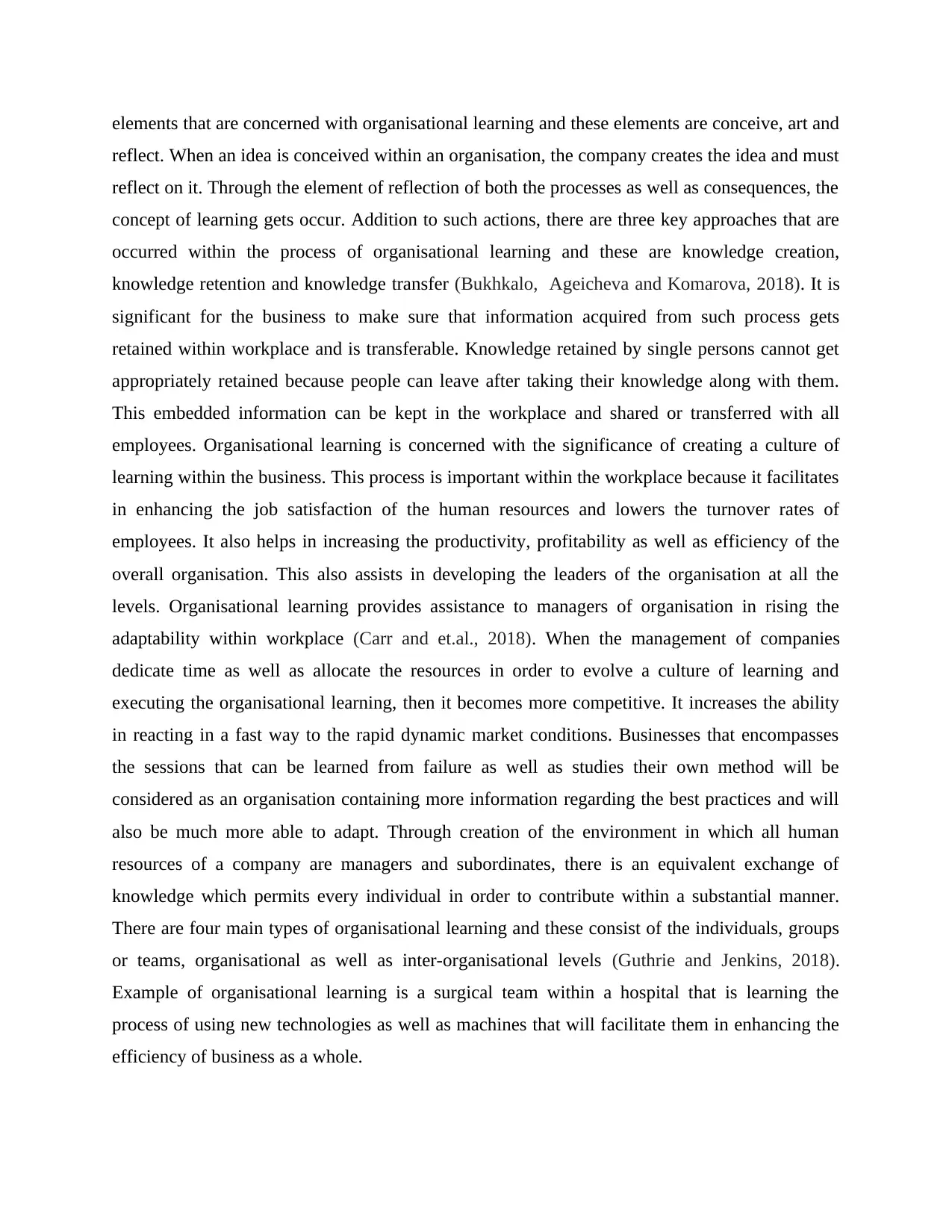
elements that are concerned with organisational learning and these elements are conceive, art and
reflect. When an idea is conceived within an organisation, the company creates the idea and must
reflect on it. Through the element of reflection of both the processes as well as consequences, the
concept of learning gets occur. Addition to such actions, there are three key approaches that are
occurred within the process of organisational learning and these are knowledge creation,
knowledge retention and knowledge transfer (Bukhkalo, Ageicheva and Komarova, 2018). It is
significant for the business to make sure that information acquired from such process gets
retained within workplace and is transferable. Knowledge retained by single persons cannot get
appropriately retained because people can leave after taking their knowledge along with them.
This embedded information can be kept in the workplace and shared or transferred with all
employees. Organisational learning is concerned with the significance of creating a culture of
learning within the business. This process is important within the workplace because it facilitates
in enhancing the job satisfaction of the human resources and lowers the turnover rates of
employees. It also helps in increasing the productivity, profitability as well as efficiency of the
overall organisation. This also assists in developing the leaders of the organisation at all the
levels. Organisational learning provides assistance to managers of organisation in rising the
adaptability within workplace (Carr and et.al., 2018). When the management of companies
dedicate time as well as allocate the resources in order to evolve a culture of learning and
executing the organisational learning, then it becomes more competitive. It increases the ability
in reacting in a fast way to the rapid dynamic market conditions. Businesses that encompasses
the sessions that can be learned from failure as well as studies their own method will be
considered as an organisation containing more information regarding the best practices and will
also be much more able to adapt. Through creation of the environment in which all human
resources of a company are managers and subordinates, there is an equivalent exchange of
knowledge which permits every individual in order to contribute within a substantial manner.
There are four main types of organisational learning and these consist of the individuals, groups
or teams, organisational as well as inter-organisational levels (Guthrie and Jenkins, 2018).
Example of organisational learning is a surgical team within a hospital that is learning the
process of using new technologies as well as machines that will facilitate them in enhancing the
efficiency of business as a whole.
reflect. When an idea is conceived within an organisation, the company creates the idea and must
reflect on it. Through the element of reflection of both the processes as well as consequences, the
concept of learning gets occur. Addition to such actions, there are three key approaches that are
occurred within the process of organisational learning and these are knowledge creation,
knowledge retention and knowledge transfer (Bukhkalo, Ageicheva and Komarova, 2018). It is
significant for the business to make sure that information acquired from such process gets
retained within workplace and is transferable. Knowledge retained by single persons cannot get
appropriately retained because people can leave after taking their knowledge along with them.
This embedded information can be kept in the workplace and shared or transferred with all
employees. Organisational learning is concerned with the significance of creating a culture of
learning within the business. This process is important within the workplace because it facilitates
in enhancing the job satisfaction of the human resources and lowers the turnover rates of
employees. It also helps in increasing the productivity, profitability as well as efficiency of the
overall organisation. This also assists in developing the leaders of the organisation at all the
levels. Organisational learning provides assistance to managers of organisation in rising the
adaptability within workplace (Carr and et.al., 2018). When the management of companies
dedicate time as well as allocate the resources in order to evolve a culture of learning and
executing the organisational learning, then it becomes more competitive. It increases the ability
in reacting in a fast way to the rapid dynamic market conditions. Businesses that encompasses
the sessions that can be learned from failure as well as studies their own method will be
considered as an organisation containing more information regarding the best practices and will
also be much more able to adapt. Through creation of the environment in which all human
resources of a company are managers and subordinates, there is an equivalent exchange of
knowledge which permits every individual in order to contribute within a substantial manner.
There are four main types of organisational learning and these consist of the individuals, groups
or teams, organisational as well as inter-organisational levels (Guthrie and Jenkins, 2018).
Example of organisational learning is a surgical team within a hospital that is learning the
process of using new technologies as well as machines that will facilitate them in enhancing the
efficiency of business as a whole.
Paraphrase This Document
Need a fresh take? Get an instant paraphrase of this document with our AI Paraphraser
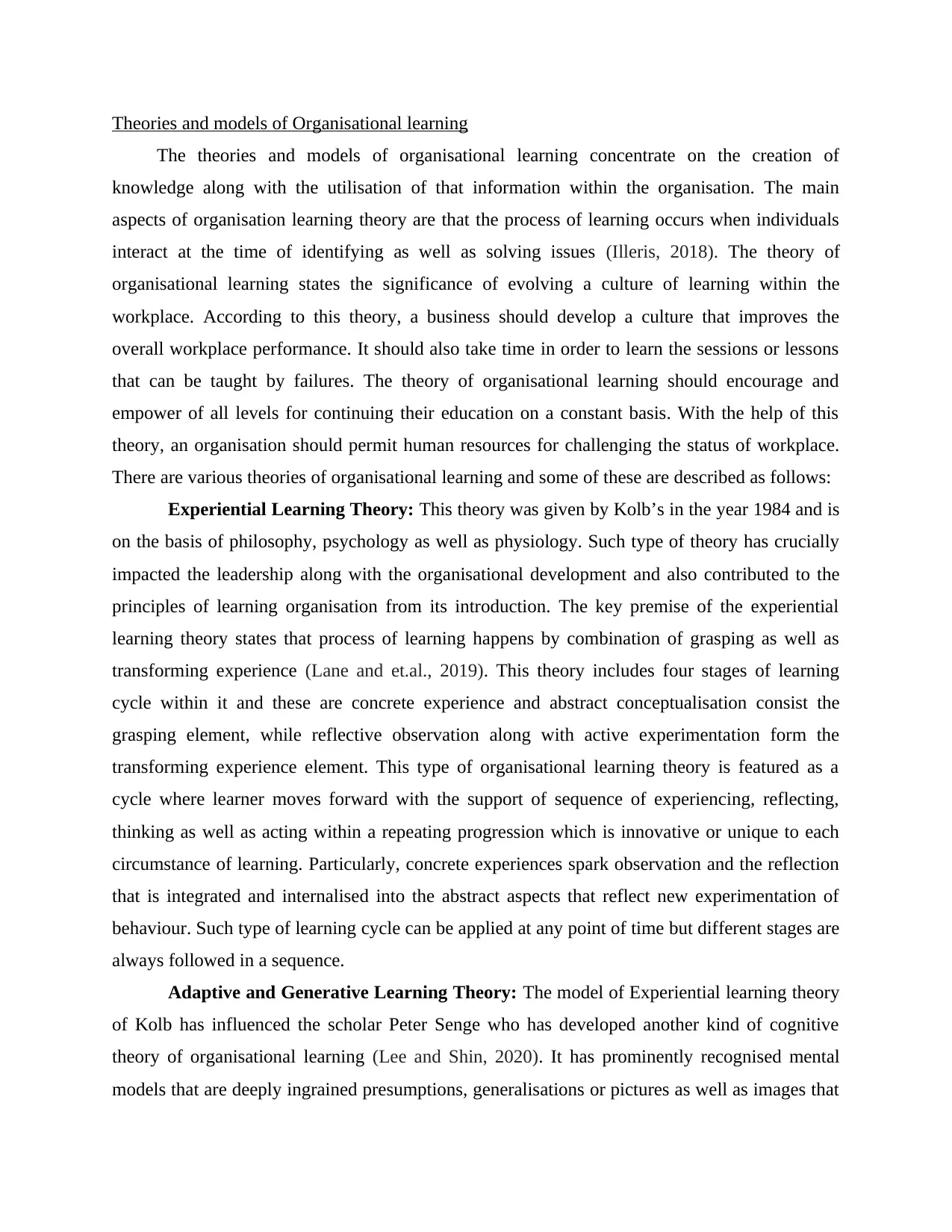
Theories and models of Organisational learning
The theories and models of organisational learning concentrate on the creation of
knowledge along with the utilisation of that information within the organisation. The main
aspects of organisation learning theory are that the process of learning occurs when individuals
interact at the time of identifying as well as solving issues (Illeris, 2018). The theory of
organisational learning states the significance of evolving a culture of learning within the
workplace. According to this theory, a business should develop a culture that improves the
overall workplace performance. It should also take time in order to learn the sessions or lessons
that can be taught by failures. The theory of organisational learning should encourage and
empower of all levels for continuing their education on a constant basis. With the help of this
theory, an organisation should permit human resources for challenging the status of workplace.
There are various theories of organisational learning and some of these are described as follows:
Experiential Learning Theory: This theory was given by Kolb’s in the year 1984 and is
on the basis of philosophy, psychology as well as physiology. Such type of theory has crucially
impacted the leadership along with the organisational development and also contributed to the
principles of learning organisation from its introduction. The key premise of the experiential
learning theory states that process of learning happens by combination of grasping as well as
transforming experience (Lane and et.al., 2019). This theory includes four stages of learning
cycle within it and these are concrete experience and abstract conceptualisation consist the
grasping element, while reflective observation along with active experimentation form the
transforming experience element. This type of organisational learning theory is featured as a
cycle where learner moves forward with the support of sequence of experiencing, reflecting,
thinking as well as acting within a repeating progression which is innovative or unique to each
circumstance of learning. Particularly, concrete experiences spark observation and the reflection
that is integrated and internalised into the abstract aspects that reflect new experimentation of
behaviour. Such type of learning cycle can be applied at any point of time but different stages are
always followed in a sequence.
Adaptive and Generative Learning Theory: The model of Experiential learning theory
of Kolb has influenced the scholar Peter Senge who has developed another kind of cognitive
theory of organisational learning (Lee and Shin, 2020). It has prominently recognised mental
models that are deeply ingrained presumptions, generalisations or pictures as well as images that
The theories and models of organisational learning concentrate on the creation of
knowledge along with the utilisation of that information within the organisation. The main
aspects of organisation learning theory are that the process of learning occurs when individuals
interact at the time of identifying as well as solving issues (Illeris, 2018). The theory of
organisational learning states the significance of evolving a culture of learning within the
workplace. According to this theory, a business should develop a culture that improves the
overall workplace performance. It should also take time in order to learn the sessions or lessons
that can be taught by failures. The theory of organisational learning should encourage and
empower of all levels for continuing their education on a constant basis. With the help of this
theory, an organisation should permit human resources for challenging the status of workplace.
There are various theories of organisational learning and some of these are described as follows:
Experiential Learning Theory: This theory was given by Kolb’s in the year 1984 and is
on the basis of philosophy, psychology as well as physiology. Such type of theory has crucially
impacted the leadership along with the organisational development and also contributed to the
principles of learning organisation from its introduction. The key premise of the experiential
learning theory states that process of learning happens by combination of grasping as well as
transforming experience (Lane and et.al., 2019). This theory includes four stages of learning
cycle within it and these are concrete experience and abstract conceptualisation consist the
grasping element, while reflective observation along with active experimentation form the
transforming experience element. This type of organisational learning theory is featured as a
cycle where learner moves forward with the support of sequence of experiencing, reflecting,
thinking as well as acting within a repeating progression which is innovative or unique to each
circumstance of learning. Particularly, concrete experiences spark observation and the reflection
that is integrated and internalised into the abstract aspects that reflect new experimentation of
behaviour. Such type of learning cycle can be applied at any point of time but different stages are
always followed in a sequence.
Adaptive and Generative Learning Theory: The model of Experiential learning theory
of Kolb has influenced the scholar Peter Senge who has developed another kind of cognitive
theory of organisational learning (Lee and Shin, 2020). It has prominently recognised mental
models that are deeply ingrained presumptions, generalisations or pictures as well as images that
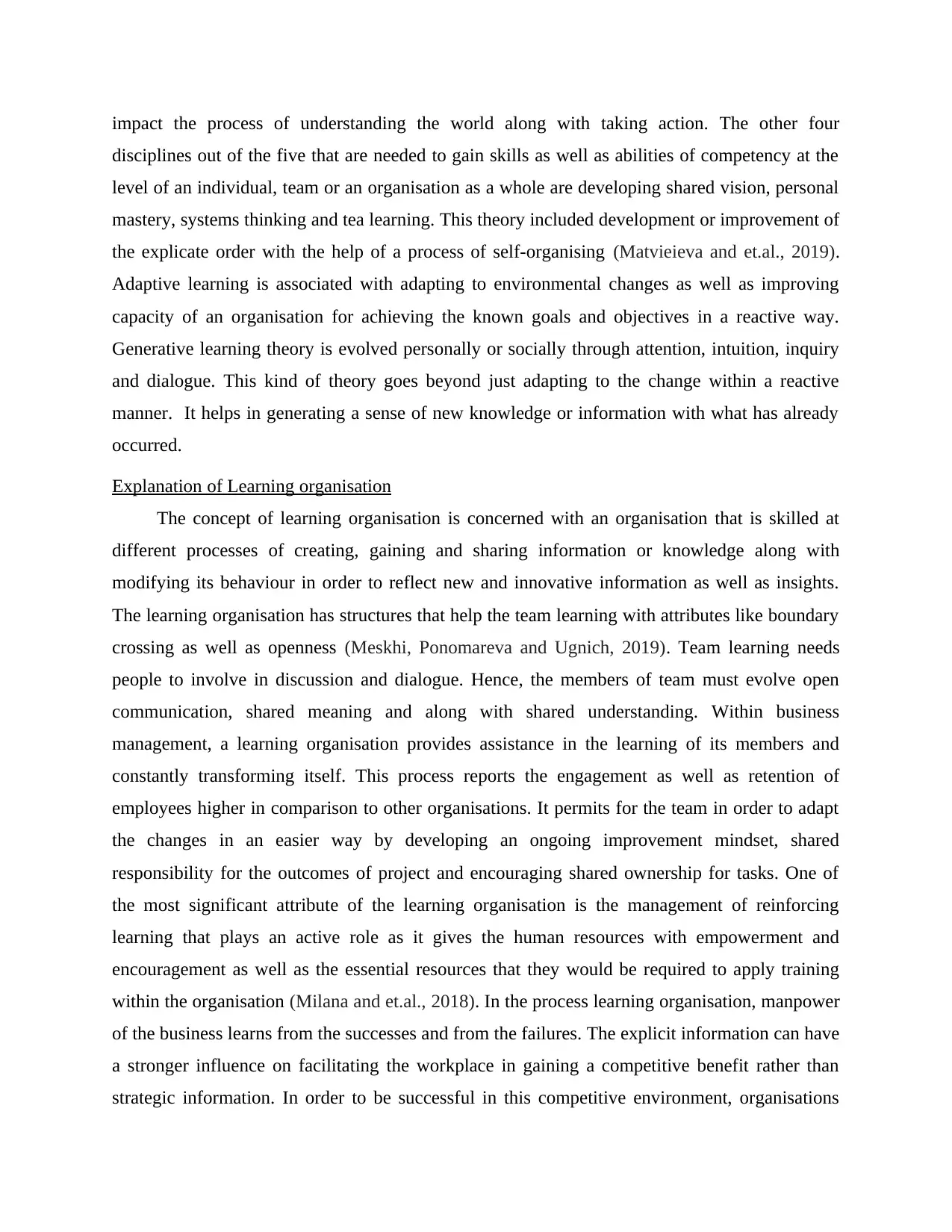
impact the process of understanding the world along with taking action. The other four
disciplines out of the five that are needed to gain skills as well as abilities of competency at the
level of an individual, team or an organisation as a whole are developing shared vision, personal
mastery, systems thinking and tea learning. This theory included development or improvement of
the explicate order with the help of a process of self-organising (Matvieieva and et.al., 2019).
Adaptive learning is associated with adapting to environmental changes as well as improving
capacity of an organisation for achieving the known goals and objectives in a reactive way.
Generative learning theory is evolved personally or socially through attention, intuition, inquiry
and dialogue. This kind of theory goes beyond just adapting to the change within a reactive
manner. It helps in generating a sense of new knowledge or information with what has already
occurred.
Explanation of Learning organisation
The concept of learning organisation is concerned with an organisation that is skilled at
different processes of creating, gaining and sharing information or knowledge along with
modifying its behaviour in order to reflect new and innovative information as well as insights.
The learning organisation has structures that help the team learning with attributes like boundary
crossing as well as openness (Meskhi, Ponomareva and Ugnich, 2019). Team learning needs
people to involve in discussion and dialogue. Hence, the members of team must evolve open
communication, shared meaning and along with shared understanding. Within business
management, a learning organisation provides assistance in the learning of its members and
constantly transforming itself. This process reports the engagement as well as retention of
employees higher in comparison to other organisations. It permits for the team in order to adapt
the changes in an easier way by developing an ongoing improvement mindset, shared
responsibility for the outcomes of project and encouraging shared ownership for tasks. One of
the most significant attribute of the learning organisation is the management of reinforcing
learning that plays an active role as it gives the human resources with empowerment and
encouragement as well as the essential resources that they would be required to apply training
within the organisation (Milana and et.al., 2018). In the process learning organisation, manpower
of the business learns from the successes and from the failures. The explicit information can have
a stronger influence on facilitating the workplace in gaining a competitive benefit rather than
strategic information. In order to be successful in this competitive environment, organisations
disciplines out of the five that are needed to gain skills as well as abilities of competency at the
level of an individual, team or an organisation as a whole are developing shared vision, personal
mastery, systems thinking and tea learning. This theory included development or improvement of
the explicate order with the help of a process of self-organising (Matvieieva and et.al., 2019).
Adaptive learning is associated with adapting to environmental changes as well as improving
capacity of an organisation for achieving the known goals and objectives in a reactive way.
Generative learning theory is evolved personally or socially through attention, intuition, inquiry
and dialogue. This kind of theory goes beyond just adapting to the change within a reactive
manner. It helps in generating a sense of new knowledge or information with what has already
occurred.
Explanation of Learning organisation
The concept of learning organisation is concerned with an organisation that is skilled at
different processes of creating, gaining and sharing information or knowledge along with
modifying its behaviour in order to reflect new and innovative information as well as insights.
The learning organisation has structures that help the team learning with attributes like boundary
crossing as well as openness (Meskhi, Ponomareva and Ugnich, 2019). Team learning needs
people to involve in discussion and dialogue. Hence, the members of team must evolve open
communication, shared meaning and along with shared understanding. Within business
management, a learning organisation provides assistance in the learning of its members and
constantly transforming itself. This process reports the engagement as well as retention of
employees higher in comparison to other organisations. It permits for the team in order to adapt
the changes in an easier way by developing an ongoing improvement mindset, shared
responsibility for the outcomes of project and encouraging shared ownership for tasks. One of
the most significant attribute of the learning organisation is the management of reinforcing
learning that plays an active role as it gives the human resources with empowerment and
encouragement as well as the essential resources that they would be required to apply training
within the organisation (Milana and et.al., 2018). In the process learning organisation, manpower
of the business learns from the successes and from the failures. The explicit information can have
a stronger influence on facilitating the workplace in gaining a competitive benefit rather than
strategic information. In order to be successful in this competitive environment, organisations
⊘ This is a preview!⊘
Do you want full access?
Subscribe today to unlock all pages.

Trusted by 1+ million students worldwide
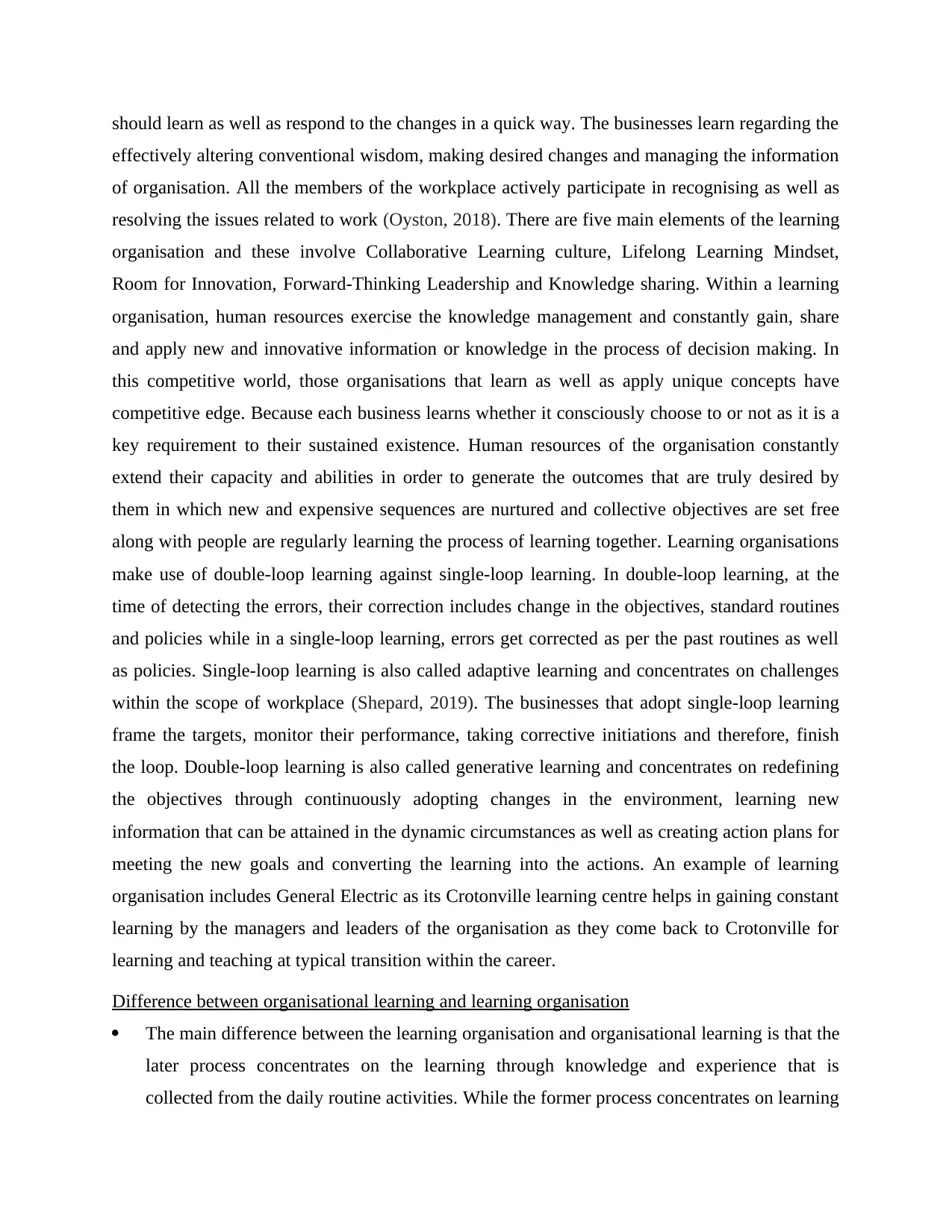
should learn as well as respond to the changes in a quick way. The businesses learn regarding the
effectively altering conventional wisdom, making desired changes and managing the information
of organisation. All the members of the workplace actively participate in recognising as well as
resolving the issues related to work (Oyston, 2018). There are five main elements of the learning
organisation and these involve Collaborative Learning culture, Lifelong Learning Mindset,
Room for Innovation, Forward-Thinking Leadership and Knowledge sharing. Within a learning
organisation, human resources exercise the knowledge management and constantly gain, share
and apply new and innovative information or knowledge in the process of decision making. In
this competitive world, those organisations that learn as well as apply unique concepts have
competitive edge. Because each business learns whether it consciously choose to or not as it is a
key requirement to their sustained existence. Human resources of the organisation constantly
extend their capacity and abilities in order to generate the outcomes that are truly desired by
them in which new and expensive sequences are nurtured and collective objectives are set free
along with people are regularly learning the process of learning together. Learning organisations
make use of double-loop learning against single-loop learning. In double-loop learning, at the
time of detecting the errors, their correction includes change in the objectives, standard routines
and policies while in a single-loop learning, errors get corrected as per the past routines as well
as policies. Single-loop learning is also called adaptive learning and concentrates on challenges
within the scope of workplace (Shepard, 2019). The businesses that adopt single-loop learning
frame the targets, monitor their performance, taking corrective initiations and therefore, finish
the loop. Double-loop learning is also called generative learning and concentrates on redefining
the objectives through continuously adopting changes in the environment, learning new
information that can be attained in the dynamic circumstances as well as creating action plans for
meeting the new goals and converting the learning into the actions. An example of learning
organisation includes General Electric as its Crotonville learning centre helps in gaining constant
learning by the managers and leaders of the organisation as they come back to Crotonville for
learning and teaching at typical transition within the career.
Difference between organisational learning and learning organisation
The main difference between the learning organisation and organisational learning is that the
later process concentrates on the learning through knowledge and experience that is
collected from the daily routine activities. While the former process concentrates on learning
effectively altering conventional wisdom, making desired changes and managing the information
of organisation. All the members of the workplace actively participate in recognising as well as
resolving the issues related to work (Oyston, 2018). There are five main elements of the learning
organisation and these involve Collaborative Learning culture, Lifelong Learning Mindset,
Room for Innovation, Forward-Thinking Leadership and Knowledge sharing. Within a learning
organisation, human resources exercise the knowledge management and constantly gain, share
and apply new and innovative information or knowledge in the process of decision making. In
this competitive world, those organisations that learn as well as apply unique concepts have
competitive edge. Because each business learns whether it consciously choose to or not as it is a
key requirement to their sustained existence. Human resources of the organisation constantly
extend their capacity and abilities in order to generate the outcomes that are truly desired by
them in which new and expensive sequences are nurtured and collective objectives are set free
along with people are regularly learning the process of learning together. Learning organisations
make use of double-loop learning against single-loop learning. In double-loop learning, at the
time of detecting the errors, their correction includes change in the objectives, standard routines
and policies while in a single-loop learning, errors get corrected as per the past routines as well
as policies. Single-loop learning is also called adaptive learning and concentrates on challenges
within the scope of workplace (Shepard, 2019). The businesses that adopt single-loop learning
frame the targets, monitor their performance, taking corrective initiations and therefore, finish
the loop. Double-loop learning is also called generative learning and concentrates on redefining
the objectives through continuously adopting changes in the environment, learning new
information that can be attained in the dynamic circumstances as well as creating action plans for
meeting the new goals and converting the learning into the actions. An example of learning
organisation includes General Electric as its Crotonville learning centre helps in gaining constant
learning by the managers and leaders of the organisation as they come back to Crotonville for
learning and teaching at typical transition within the career.
Difference between organisational learning and learning organisation
The main difference between the learning organisation and organisational learning is that the
later process concentrates on the learning through knowledge and experience that is
collected from the daily routine activities. While the former process concentrates on learning
Paraphrase This Document
Need a fresh take? Get an instant paraphrase of this document with our AI Paraphraser
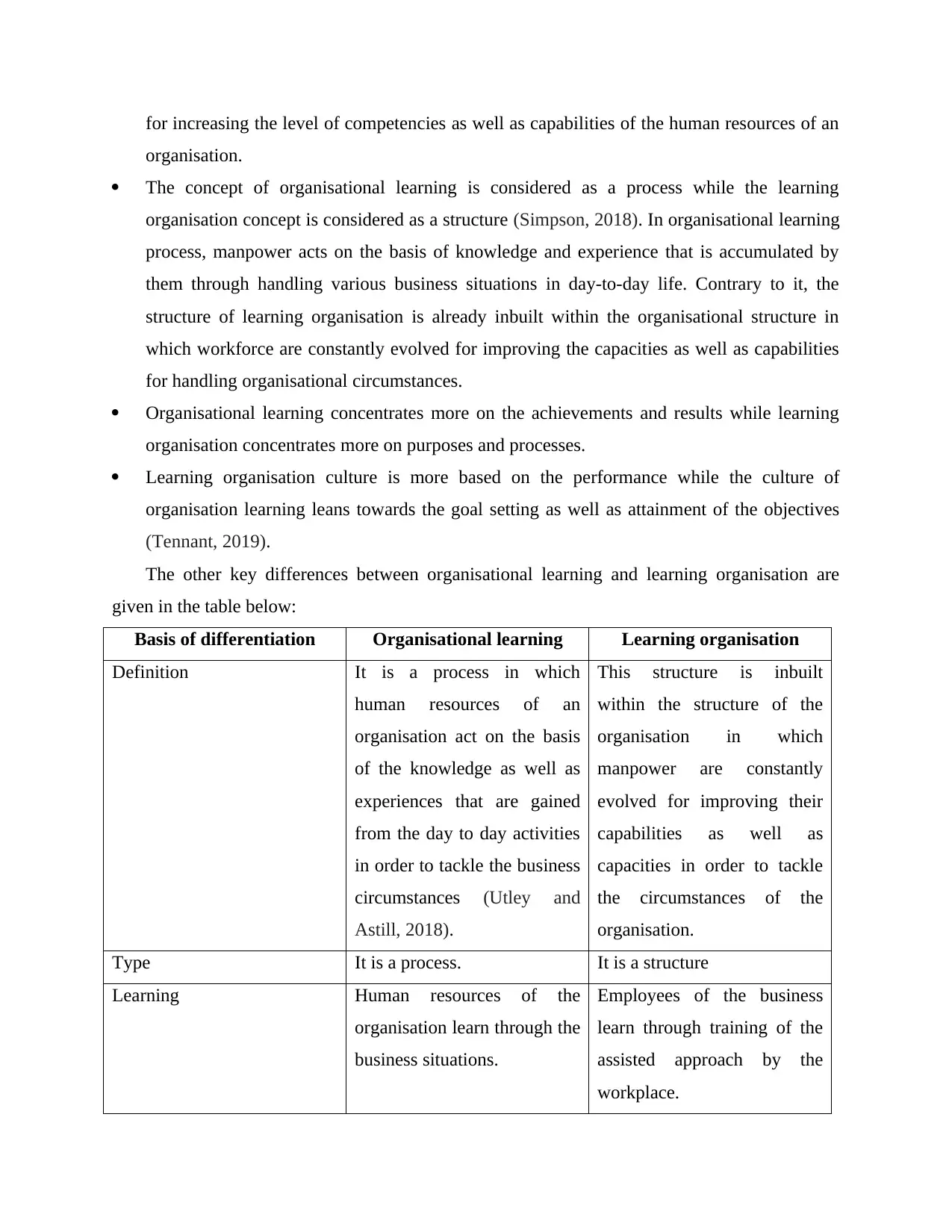
for increasing the level of competencies as well as capabilities of the human resources of an
organisation.
The concept of organisational learning is considered as a process while the learning
organisation concept is considered as a structure (Simpson, 2018). In organisational learning
process, manpower acts on the basis of knowledge and experience that is accumulated by
them through handling various business situations in day-to-day life. Contrary to it, the
structure of learning organisation is already inbuilt within the organisational structure in
which workforce are constantly evolved for improving the capacities as well as capabilities
for handling organisational circumstances.
Organisational learning concentrates more on the achievements and results while learning
organisation concentrates more on purposes and processes.
Learning organisation culture is more based on the performance while the culture of
organisation learning leans towards the goal setting as well as attainment of the objectives
(Tennant, 2019).
The other key differences between organisational learning and learning organisation are
given in the table below:
Basis of differentiation Organisational learning Learning organisation
Definition It is a process in which
human resources of an
organisation act on the basis
of the knowledge as well as
experiences that are gained
from the day to day activities
in order to tackle the business
circumstances (Utley and
Astill, 2018).
This structure is inbuilt
within the structure of the
organisation in which
manpower are constantly
evolved for improving their
capabilities as well as
capacities in order to tackle
the circumstances of the
organisation.
Type It is a process. It is a structure
Learning Human resources of the
organisation learn through the
business situations.
Employees of the business
learn through training of the
assisted approach by the
workplace.
organisation.
The concept of organisational learning is considered as a process while the learning
organisation concept is considered as a structure (Simpson, 2018). In organisational learning
process, manpower acts on the basis of knowledge and experience that is accumulated by
them through handling various business situations in day-to-day life. Contrary to it, the
structure of learning organisation is already inbuilt within the organisational structure in
which workforce are constantly evolved for improving the capacities as well as capabilities
for handling organisational circumstances.
Organisational learning concentrates more on the achievements and results while learning
organisation concentrates more on purposes and processes.
Learning organisation culture is more based on the performance while the culture of
organisation learning leans towards the goal setting as well as attainment of the objectives
(Tennant, 2019).
The other key differences between organisational learning and learning organisation are
given in the table below:
Basis of differentiation Organisational learning Learning organisation
Definition It is a process in which
human resources of an
organisation act on the basis
of the knowledge as well as
experiences that are gained
from the day to day activities
in order to tackle the business
circumstances (Utley and
Astill, 2018).
This structure is inbuilt
within the structure of the
organisation in which
manpower are constantly
evolved for improving their
capabilities as well as
capacities in order to tackle
the circumstances of the
organisation.
Type It is a process. It is a structure
Learning Human resources of the
organisation learn through the
business situations.
Employees of the business
learn through training of the
assisted approach by the
workplace.
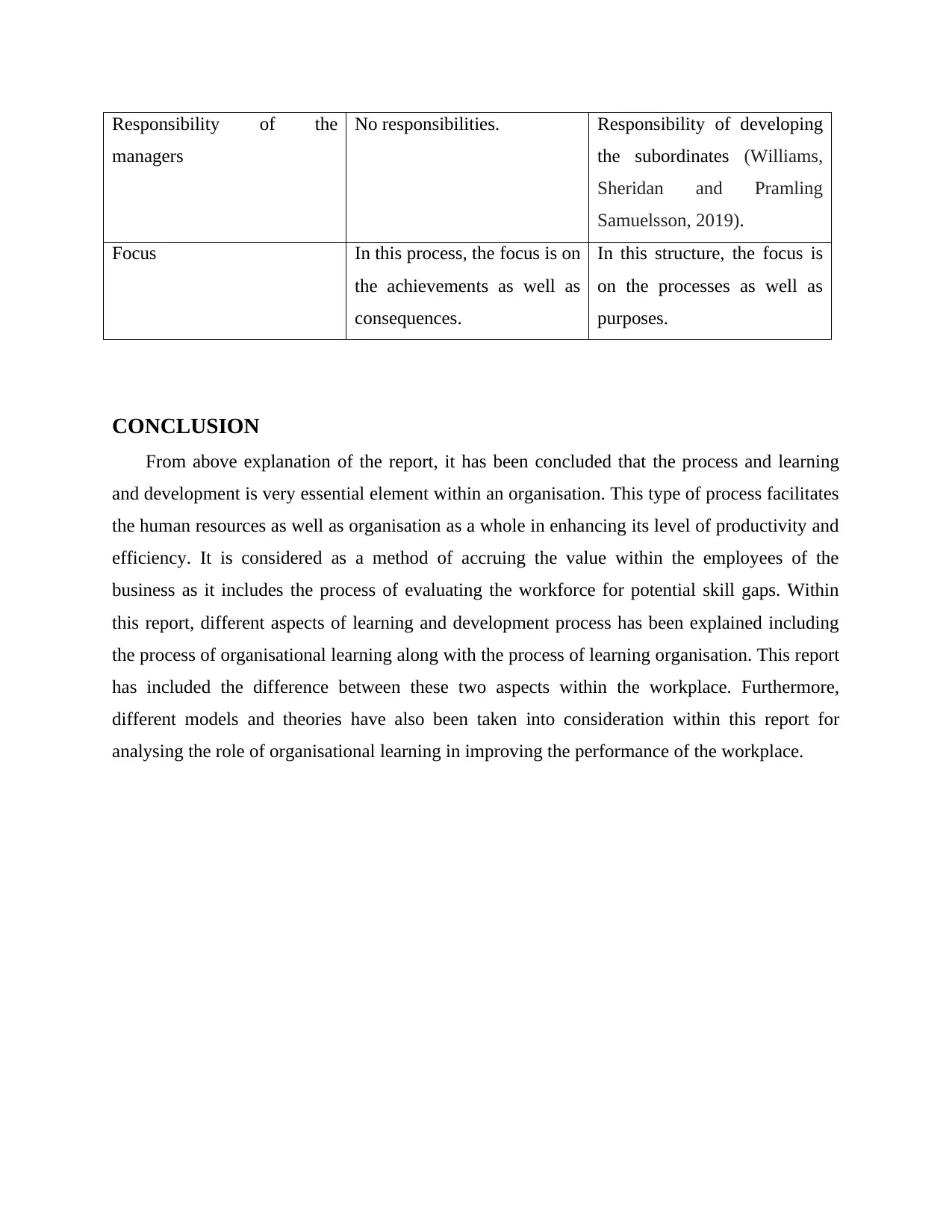
Responsibility of the
managers
No responsibilities. Responsibility of developing
the subordinates (Williams,
Sheridan and Pramling
Samuelsson, 2019).
Focus In this process, the focus is on
the achievements as well as
consequences.
In this structure, the focus is
on the processes as well as
purposes.
CONCLUSION
From above explanation of the report, it has been concluded that the process and learning
and development is very essential element within an organisation. This type of process facilitates
the human resources as well as organisation as a whole in enhancing its level of productivity and
efficiency. It is considered as a method of accruing the value within the employees of the
business as it includes the process of evaluating the workforce for potential skill gaps. Within
this report, different aspects of learning and development process has been explained including
the process of organisational learning along with the process of learning organisation. This report
has included the difference between these two aspects within the workplace. Furthermore,
different models and theories have also been taken into consideration within this report for
analysing the role of organisational learning in improving the performance of the workplace.
managers
No responsibilities. Responsibility of developing
the subordinates (Williams,
Sheridan and Pramling
Samuelsson, 2019).
Focus In this process, the focus is on
the achievements as well as
consequences.
In this structure, the focus is
on the processes as well as
purposes.
CONCLUSION
From above explanation of the report, it has been concluded that the process and learning
and development is very essential element within an organisation. This type of process facilitates
the human resources as well as organisation as a whole in enhancing its level of productivity and
efficiency. It is considered as a method of accruing the value within the employees of the
business as it includes the process of evaluating the workforce for potential skill gaps. Within
this report, different aspects of learning and development process has been explained including
the process of organisational learning along with the process of learning organisation. This report
has included the difference between these two aspects within the workplace. Furthermore,
different models and theories have also been taken into consideration within this report for
analysing the role of organisational learning in improving the performance of the workplace.
⊘ This is a preview!⊘
Do you want full access?
Subscribe today to unlock all pages.

Trusted by 1+ million students worldwide
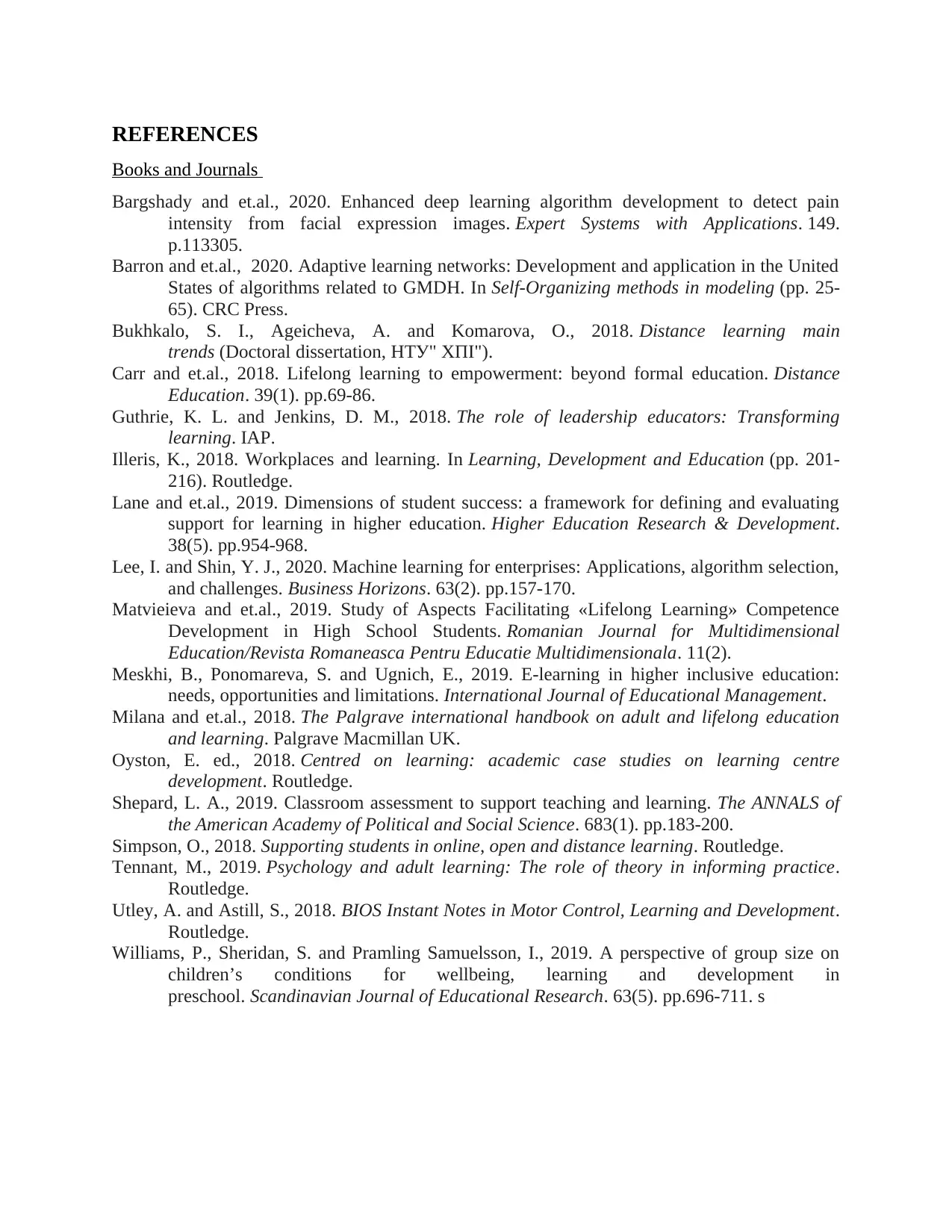
REFERENCES
Books and Journals
Bargshady and et.al., 2020. Enhanced deep learning algorithm development to detect pain
intensity from facial expression images. Expert Systems with Applications. 149.
p.113305.
Barron and et.al., 2020. Adaptive learning networks: Development and application in the United
States of algorithms related to GMDH. In Self-Organizing methods in modeling (pp. 25-
65). CRC Press.
Bukhkalo, S. I., Ageicheva, A. and Komarova, O., 2018. Distance learning main
trends (Doctoral dissertation, НТУ" ХПІ").
Carr and et.al., 2018. Lifelong learning to empowerment: beyond formal education. Distance
Education. 39(1). pp.69-86.
Guthrie, K. L. and Jenkins, D. M., 2018. The role of leadership educators: Transforming
learning. IAP.
Illeris, K., 2018. Workplaces and learning. In Learning, Development and Education (pp. 201-
216). Routledge.
Lane and et.al., 2019. Dimensions of student success: a framework for defining and evaluating
support for learning in higher education. Higher Education Research & Development.
38(5). pp.954-968.
Lee, I. and Shin, Y. J., 2020. Machine learning for enterprises: Applications, algorithm selection,
and challenges. Business Horizons. 63(2). pp.157-170.
Matvieieva and et.al., 2019. Study of Aspects Facilitating «Lifelong Learning» Competence
Development in High School Students. Romanian Journal for Multidimensional
Education/Revista Romaneasca Pentru Educatie Multidimensionala. 11(2).
Meskhi, B., Ponomareva, S. and Ugnich, E., 2019. E-learning in higher inclusive education:
needs, opportunities and limitations. International Journal of Educational Management.
Milana and et.al., 2018. The Palgrave international handbook on adult and lifelong education
and learning. Palgrave Macmillan UK.
Oyston, E. ed., 2018. Centred on learning: academic case studies on learning centre
development. Routledge.
Shepard, L. A., 2019. Classroom assessment to support teaching and learning. The ANNALS of
the American Academy of Political and Social Science. 683(1). pp.183-200.
Simpson, O., 2018. Supporting students in online, open and distance learning. Routledge.
Tennant, M., 2019. Psychology and adult learning: The role of theory in informing practice.
Routledge.
Utley, A. and Astill, S., 2018. BIOS Instant Notes in Motor Control, Learning and Development.
Routledge.
Williams, P., Sheridan, S. and Pramling Samuelsson, I., 2019. A perspective of group size on
children’s conditions for wellbeing, learning and development in
preschool. Scandinavian Journal of Educational Research. 63(5). pp.696-711. s
Books and Journals
Bargshady and et.al., 2020. Enhanced deep learning algorithm development to detect pain
intensity from facial expression images. Expert Systems with Applications. 149.
p.113305.
Barron and et.al., 2020. Adaptive learning networks: Development and application in the United
States of algorithms related to GMDH. In Self-Organizing methods in modeling (pp. 25-
65). CRC Press.
Bukhkalo, S. I., Ageicheva, A. and Komarova, O., 2018. Distance learning main
trends (Doctoral dissertation, НТУ" ХПІ").
Carr and et.al., 2018. Lifelong learning to empowerment: beyond formal education. Distance
Education. 39(1). pp.69-86.
Guthrie, K. L. and Jenkins, D. M., 2018. The role of leadership educators: Transforming
learning. IAP.
Illeris, K., 2018. Workplaces and learning. In Learning, Development and Education (pp. 201-
216). Routledge.
Lane and et.al., 2019. Dimensions of student success: a framework for defining and evaluating
support for learning in higher education. Higher Education Research & Development.
38(5). pp.954-968.
Lee, I. and Shin, Y. J., 2020. Machine learning for enterprises: Applications, algorithm selection,
and challenges. Business Horizons. 63(2). pp.157-170.
Matvieieva and et.al., 2019. Study of Aspects Facilitating «Lifelong Learning» Competence
Development in High School Students. Romanian Journal for Multidimensional
Education/Revista Romaneasca Pentru Educatie Multidimensionala. 11(2).
Meskhi, B., Ponomareva, S. and Ugnich, E., 2019. E-learning in higher inclusive education:
needs, opportunities and limitations. International Journal of Educational Management.
Milana and et.al., 2018. The Palgrave international handbook on adult and lifelong education
and learning. Palgrave Macmillan UK.
Oyston, E. ed., 2018. Centred on learning: academic case studies on learning centre
development. Routledge.
Shepard, L. A., 2019. Classroom assessment to support teaching and learning. The ANNALS of
the American Academy of Political and Social Science. 683(1). pp.183-200.
Simpson, O., 2018. Supporting students in online, open and distance learning. Routledge.
Tennant, M., 2019. Psychology and adult learning: The role of theory in informing practice.
Routledge.
Utley, A. and Astill, S., 2018. BIOS Instant Notes in Motor Control, Learning and Development.
Routledge.
Williams, P., Sheridan, S. and Pramling Samuelsson, I., 2019. A perspective of group size on
children’s conditions for wellbeing, learning and development in
preschool. Scandinavian Journal of Educational Research. 63(5). pp.696-711. s
1 out of 10
Related Documents
Your All-in-One AI-Powered Toolkit for Academic Success.
+13062052269
info@desklib.com
Available 24*7 on WhatsApp / Email
![[object Object]](/_next/static/media/star-bottom.7253800d.svg)
Unlock your academic potential
Copyright © 2020–2026 A2Z Services. All Rights Reserved. Developed and managed by ZUCOL.




